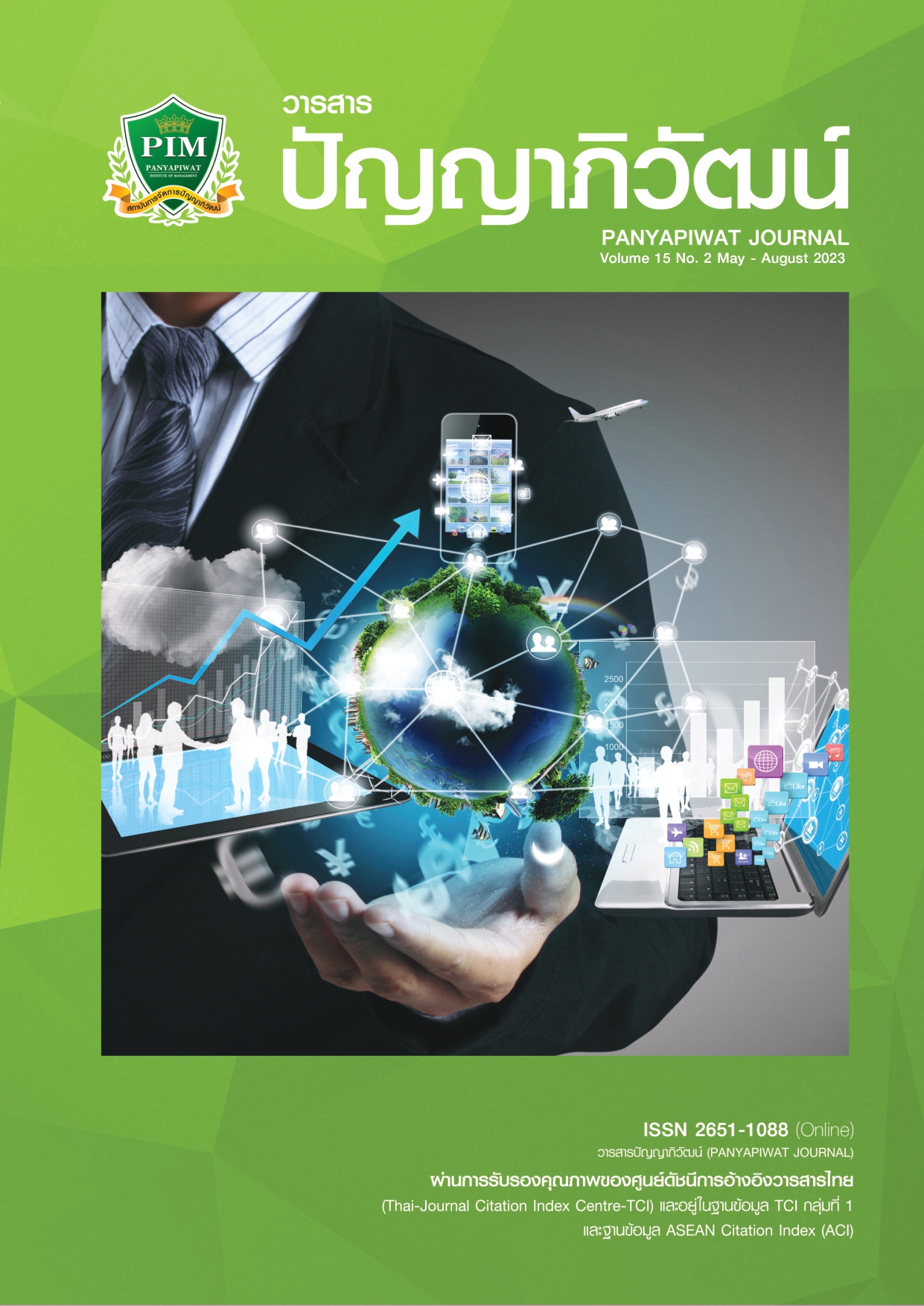บทวิเคราะห์ระบบเครดิตทางสังคมของสาธารณรัฐประชาชนจีนและประเทศไทย
Main Article Content
บทคัดย่อ
บทความวิชาการนี้มีวัตถุประสงค์เพื่ออธิบายพัฒนาการระบบเครดิตทางสังคมในสาธารณรัฐประชาชนจีน และระบบเครดิตทางสังคมผ่านการส่งเสริมคุณธรรมในประเทศไทย และนําเสนอแนวทางการประยุกต์ใช้ระบบเครดิตทางสังคมกับการส่งเสริมให้คุณธรรมในประเทศไทย สําหรับสาธารณรัฐประชาชนจีนใช้เพื่อสร้างความน่าเชื่อถือและควบคุมพฤติกรรมของประชาชนในมีความซื่อสัตย์ โดยเก็บข้อมูลผ่านระบบข้อมูลขนาดใหญ่ และแปลงพฤติกรรมต่าง ๆ ออกมาเป็นค่าคะแนนบวกสําหรับพฤติกรรมที่ดี คะแนนลบสําหรับพฤติกรรมที่ไม่ดี และบทลงโทษสําหรับประเทศไทยระบบนี้ถูกใช้ผ่านการส่งเสริมคุณธรรมเพื่อแก้ไขปัญหาทางสังคม แต่ไม่มีบทลงโทษ โดยมีแผนส่งเสริมคุณธรรมแห่งชาติมีคุณธรรมหลักของชาติคือ พอเพียง มีวินัย สุจริต และจิตอาสา เป็นกรอบให้องค์กรและพื้นที่ต่าง ๆ ดําเนินการส่งเสริมคุณธรรมตามบทบาทหรือภารกิจของตน และผลที่เกิดขึ้น คือ มีองค์กรต้นแบบคุณธรรม 4,923 แห่ง และจังหวัดคุณธรรม 10 จังหวัด
Article Details

อนุญาตภายใต้เงื่อนไข Creative Commons Attribution-NonCommercial-NoDerivatives 4.0 International License.
“ข้าพเจ้าและผู้เขียนร่วม (ถ้ามี) ขอรับรองว่า บทความที่เสนอมานี้ยังไม่เคยได้รับการตีพิมพ์และไม่ได้อยู่ระหว่างกระบวนการพิจารณาลงตีพิมพ์ในวารสารหรือแหล่งเผยแพร่อื่นใด ข้าพเจ้าและผู้เขียนร่วมยอมรับหลักเกณฑ์การพิจารณาต้นฉบับ ทั้งยินยอมให้กองบรรณาธิการมีสิทธิ์พิจารณาและตรวจแก้ต้นฉบับได้ตามที่เห็นสมควร พร้อมนี้ขอมอบลิขสิทธิ์บทความที่ได้รับการตีพิมพ์ให้แก่สถาบันการจัดการปัญญาภิวัฒน์หากมีการฟ้องร้องเรื่องการละเมิดลิขสิทธิ์เกี่ยวกับภาพ กราฟ ข้อความส่วนใดส่วนหนึ่งและ/หรือข้อคิดเห็นที่ปรากฏในบทความข้าพเจ้าและผู้เขียนร่วมยินยอมรับผิดชอบแต่เพียงฝ่ายเดียว”
เอกสารอ้างอิง
Ahmed, S. (2017). Cashless society, cached data—Security considerations for a Chinese social
credit system. Citizenlab. https://citizenlab.ca/2017/01/cashless-societycached-datasecurity-considerations-chinese-social-credit-system/
Bank of Thailand. (2017). Yunnan economic and monetary report 2017. Bank of Thailand.
Credit China. (2018). Websites of local social credit pilot cities. https://www.creditchina.gov.cn/home/index.html
Community Organizations Development Institute. (2020). Moral Bank, Nong Sarai Subdistrict,
Phanom Thuan District, Kanchanaburi Provine. https://web.codi.or.th/20200207-10743/ [in Thai]
Department of Mental Health, Ministry of Public Health. (2021). The Ministry of Public Health is committed to being a moral organization with “sufficiency, discipline, honesty, volunteering”. https://www.dmh.go.th/news-dmh/view.asp?id=31073 [in Thai]
Donnelly, D. (2021). An introduction to the china social credit system. NH Global Partners. https://nhglobalpartners.com/chinas-social-credit-system
Gertz, B. (2019). Social credit system, China mass surveillance tool, designed to enforce political control. Washington Times. https://www.washingtontimes.com/news/2019/dec/9/social-credit-system-china-mass-surveillance-tool-/
Granovetter, S. (1973). The strength of weak ties. The American Journal of Sociology, 78(6), 1360-1380.
Hatton, C. (2015). China social credit: Beijing sets up huge system. BBC. https://www.bbc.com/news/world-asia-china-34592186-explained/
Jitniyom, S. (2019). Improve people’s quality of life for sustainable happiness with the Nong Sarai Subdistrict Community Fund. Thaiichr. https://bit.ly/3A2QC3y [in Thai]
Kostka, G. (2018). China’s social credit systems and public opinion: Explaining high levels of approval. New Media & Society, 21(7), 1565-1593.
Lee, A. (2020). Explainer | what is china’s social credit system and why is it controversial? SCMP. https://www.scmp.com/economy/china-economy/article/3096090/what-chinas-socialcredit-system-and-why
Moral Promotion Board. (2015). National integrity plan 2014-2016 (revised version). Moral Promotion Center. [in Thai]
Moral Promotion Center. (2019). 10 phenomena of morality and ethics in Thai society. Moral Promotion Center. [in Thai]
Moral Promotion Center. (2021a). Information of the organization’s network of moral centers. https://bit.ly/39c6vK6 [in Thai]
Moral Promotion Center. (2021b). Term of reference: Concepts and feasibility of implementing social credit system mechanisms. https://moralcenter.or.th/images/PDF_Purchase/2021/30-04-64 [in Thai]
Na Sakolnakorn, T. P. (2013). Book review: Ted C. Fishman, China Inc. Panyapiwat Journal, 4(2), 174-178. [in Thai]
National Development and Reform Commission. (2018). The list of the first batch of model cities for the construction of the social credit system is announced. http://www.ndrc.gov.cn/xwzx/xwfb/201801/t20180109_873409.html
Office of the conference, the Secretariat of the Senate. (2020). Summary of the senate meeting the 14th/2020, Tuesday 14 July 2020. https://bit.ly/2YUQExB [in Thai]
Office of the Public Sector Development Commission. (2020). Anti-corruption action monitoring report fiscal year 2020 for 6 months (October 2019-March 2020). Office of the Public Sector Development Commission. [in Thai]
Putnam, R. (1993). Making democracy work: Civic traditions in modern. Princeton University Press.
Shahin, S., & Zheng, P. (2020). Big data and the illusion of choice: Comparing the evolution of india’s aadhaar and China’s social credit system as technosocial discourses. Social Science Computer Review, 38(1), 1-17.
State Council. (2007). Opinions of the state council concerning the construction of the social credit system. http://www.gov.cn/zwgk/2007-04/02/content_569314.html [in Thai]
State Council. (2017). Notice of the state council on issuing the planning outline for the construction of the social credit system (2014-2020). http://www.gov.cn/zhengce/content/2014-06/27/content_8913.html
Sub-Committee on Morality, Ethics in the Committee on Religion, Morality, Ethics, Arts and Culture, Senate. (2013). Summary of sub-committee on morality meeting the 10th/2013, Tuesday 14 July 2020. https://www.senate.go.th/document/mSummaryM/Ext14/14601_0001.PDF [in Thai]
Thararoop, N., & Limledjalearnvanit, N. (2016). The lesson learned from implementation of national integrity plan under the practice of moral assembly. Suthiparithat Journal, 30(93), 193-207. [in Thai]
Thararoop, N., & Limledjalearnvanit, N. (2017). Lesson learned from the promotion moral in Thai society during the 2014-2016. In The 56th Kasetsart University Annual Conference, 6-9 February 2017 (pp. 38-39). Kasetsart University. [in Thai]
Thararoop, N., Phimolsri, T., Limledjalearnvanit, N., & Wongthongdee, S. (2021). Cultivating integrity cultures for the prevention and suppression of corruption. Suthiparithat Journal, 35(3), 81-97. [in Thai]
Thaipost. (2019). China and social credit system. https://bit.ly/3lPF9Q0 [in Thai]
Vorakitphokatorn, S., Pokpong, S., Yongyuan, B., Musikphan, W., & Saithong, S. (2009). Complete research report, features and process of implantation morality and ethics in Thailand. National Institute for Child and Family Development, Mahidol University. [in Thai]


